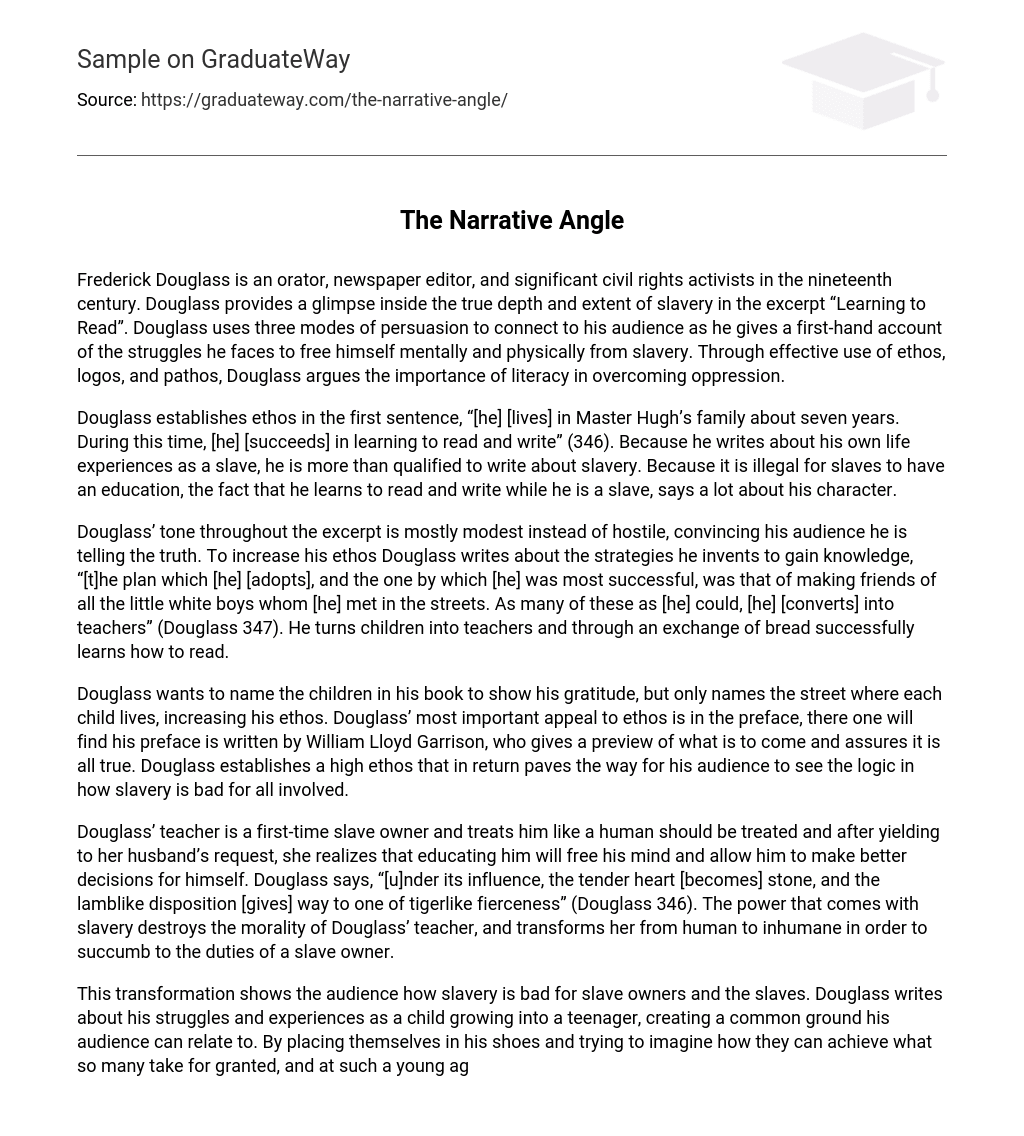Frederick Douglass, an orator, newspaper editor, and prominent civil rights activist in the nineteenth century, offers insight into the harrowing reality of slavery in his excerpt “Learning to Read”. Douglass employs ethos, logos, and pathos to connect with his audience, recounting his personal struggle to emancipate himself both mentally and physically from slavery. Thus, he emphasizes the significance of literacy in overcoming oppression.
In the first sentence, Douglass establishes his ethos by stating that he lived in Master Hugh’s family for approximately seven years and during this time, he successfully learned how to read and write (346). This personal account of his life as a slave gives him credibility to discuss slavery. His ability to acquire an education as a slave, despite it being illegal, speaks volumes about his character.
In the excerpt, Douglass maintains a largely humble tone rather than a hostile one, effectively convincing his audience of his truthful narrative. To enhance his credibility, Douglass recounts the methods he devised to acquire knowledge, stating: “[t]he plan which [he] [adopts], and the one by which [he] was most successful, was that of making friends of all the little white boys whom [he] met in the streets. As many of these as [he] could, [he] [converts] into teachers” (Douglass 347). By transforming these youngsters into instructors, he manages to learn how to read by exchanging pieces of bread.
Douglass desires to express his gratitude by naming the children in his book, but instead he only mentions the street where each child resides. This choice enhances his credibility. The most significant demonstration of Douglass’ ethos can be found in the preface, where William Lloyd Garrison authors it and provides a glimpse of what lies ahead, reassuring its authenticity. By establishing a strong ethos, Douglass enables his audience to comprehend the rationale behind why slavery is detrimental to all parties involved.
Douglass’ teacher initially treats him as a human should be treated. However, after giving in to her husband’s request, she recognizes that educating Douglass will empower him to make better choices in his life. According to Douglass, the power of slavery has the ability to corrupt an individual’s morality. It turns his teacher from a compassionate person to an inhumane figure who carries out the responsibilities of a slave owner. Douglass describes this transformation by stating that under the influence of slavery, her tender heart hardens and her docile nature gives way to a fierce and aggressive demeanor (Douglass 346).
This transformation illustrates the negative impact of slavery on both slave owners and slaves. Douglass recounts his difficulties and encounters from childhood to adolescence, establishing a shared experience that resonates with his audience. By urging them to empathize and imagine the challenges faced by someone their age, it lays the foundation for Douglass to employ his most compelling form of persuasion. Douglass’ effective use of pathos forms the crux of his argument regarding the significance of literacy.
By employing descriptive language, the author effectively paints a vivid image for the readers and evokes a wide range of emotions. The author recounts the experiences of young children who express sympathy towards him due to his lifelong enslavement, while also expressing his own aspiration for freedom. The author intends to demonstrate that even a child recognizes the evil of slavery. Despite the eventual liberation that literacy grants him, the truth still holds him captive mentally. In the words of Douglass, he proclaims that the sound of freedom has awakened his soul, leading to an everlasting state of wakefulness. Freedom now emerges as an enduring presence in his life, never to disappear again.
Douglass’ objective is to achieve freedom, and he is now fully aware of the magnitude and severity of slavery, but he also realizes that he is powerless to eradicate it. The horror of slavery was so intense that he even envied the oblivious slaves and contemplated death, but it was hope that ultimately rescued him. Douglass effectively employs emotions such as sympathy, fear, anger, and hope, skillfully appealing to pathos. By incorporating ethos, logos, and pathos in his argument, he is able to convince the audience to join him in the battle against slavery.
Douglass believed that literacy was crucial for overcoming oppression, and he effectively conveyed this message by establishing ethical credibility, using logical reasoning, and appealing to emotions. He realized through his own journey to learn how to read and write that knowledge is the essential tool for attaining freedom. It is important to note that the strategies employed by a writer are just as significant as the message itself. Many individuals fail to recognize that persuasion is inherent in our daily conversations. However, by practicing persuasive techniques, one can enhance their likelihood of achieving favorable outcomes.





